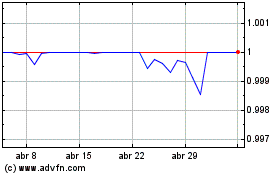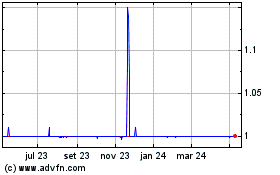Bitcoin reacts positively to US employment data
Bitcoin (COIN:BTCUSD) rose about 2.3% on October 4, reaching an
intraday high of $62,348.87 after US employment data exceeded
expectations. 254,000 non-farm jobs were added in September,
compared to the forecast of 147,000. The market responded
optimistically, with both the S&P 500 and Nasdaq also
rising.
Inflation data to be released on October 10 will also be crucial
in maintaining this positive trend. Since the September 18 interest
rate cut, US Treasury yields have fallen, while gold has risen 5%.
Analysts suggest that Bitcoin, seen as “digital gold,” may follow a
similar path.
The drop in yields coincides with the increase in the M2 money
supply, a factor that has boosted safe-haven assets during past
crises, such as in 2008. The global rise in the money supply
reinforces expectations of Bitcoin appreciation, according to André
Dragosch, head of research at Bitwise Europe.
Bitwise launches ETF combining Bitcoin and US Treasuries
Bitwise announced the launch of the “Bitwise Trendwise Bitcoin
and Treasuries Rotation Strategy” ETF (BITC), merging three
previous funds focused on cryptocurrency futures contracts. The
move comes after the launch of spot Bitcoin and Ether ETFs, which
reduced interest in futures-based products. The new fund alternates
between full exposure to cryptocurrency futures contracts and US
Treasuries, aiming to manage market volatility. The conversion will
be finalized on December 3, with a fee of 0.85%.
Bitcoin and Ether ETFs contribute to weekly crypto price drop
On October 3, US-listed Bitcoin ETFs saw withdrawals of $54.2
million. ETFs are pressuring cryptocurrency prices, with Bitcoin
(COIN:BTCUSD) down 4.3% and Ether (COIN:ETHUSD) down 7.4% this
week. Net outflows of $361.2 million in three days primarily
affected BTC ETFs, with highlights including Ark’s (AMEX:ARKB) and
Fidelity’s (AMEX:FBTC).
Meanwhile, Ether ETFs faced $3.2 million in outflows on
Thursday, with Grayscale (AMEX:ETHE) being the most affected.
Despite the declines, BTC and ETH ETF performance remains solid,
with 13 of the top 25 ETFs launched in 2024 focusing on these
cryptos.
Coinbase plans to remove unauthorized stablecoins in the EU by
December
Coinbase (NASDAQ:COIN) plans to remove all unlicensed
stablecoins from the European Union by December 30, 2024, to comply
with MiCA regulations. The new rule requires stablecoin issuers to
obtain licenses in at least one EU country. The exchange will limit
the provision of services in the European Economic Area to
stablecoins that do not meet the rules. Circle, the issuer of
(COIN:USDCUSD), has already secured the required license, while
Tether (COIN:USDTUSD) has not yet obtained the necessary
authorization to operate in the European bloc.
Tether strengthens ties with the US as it reaches 10 years
Tether (COIN:USDTUSD), operator of USDT, will celebrate its 10th
anniversary on October 6, highlighting its strong relationship with
the US government. The company, which holds about $98 billion in US
Treasury securities, believes this strengthens its position as a
strategic ally of the US. According to CEO Paolo Ardoino, Tether
prioritizes developing countries but maintains close ties with US
authorities, making it one of the largest holders of US debt. “I
think Tether is the US government’s best friend because we have
more US Treasuries than Germany, much more than any other
competitor or any other financial institution in the world,”
Ardoino said.
Sol Strategies plans to buy more Solana after recovering FTX funds
Sol Strategies (CSE:HODL), formerly Cypherpunk Holdings,
announced it will reinvest $600,000 received from FTX into Solana
(COIN:SOLUSD) tokens, according to Block. The Canadian company
increased its holdings in SOL to 86,294 tokens after achieving a
122% return on a previous investment. According to CEO Leah Wald,
the recovered capital will allow the company to continue
strengthening its presence in the Solana ecosystem and maintain a
solid financial base while generating staking revenue since the
second quarter of 2024.
Worldcoin faces pressure and may not be a good portfolio addition
in October
Worldcoin (COIN:WLDUSD) is up 5.6% in the last 24 hours.
However, it fell to $1.69, failing to sustain the $2.00 support.
The weekly variation is -17.3%. Investor caution is reflected in
the MVRV indicator, which is at -24%, suggesting short-term holders
are taking profits, increasing selling pressure. WLD’s Sharpe
Ratio, at its lowest point, indicates risks outweigh rewards. With
resistance at $1.74 and a possible drop to $1.34, many investors
are hesitant to add the altcoin to their portfolio this month.
BNB price signals bearish trend
The price of BNB (COIN:BNBUSD) has fallen by -6.9% this week,
indicating strong selling pressure. The ADX indicator is at 40.88,
suggesting that the bearish momentum is strengthening.
Additionally, BNB’s price is trading below the Ichimoku Cloud, a
sign of weakness indicating that sellers are dominating. The recent
“death cross” in the exponential moving averages (EMA) suggests
that selling pressure may increase further, with the price testing
critical support at $527. If this support breaks, an additional
correction of up to 12% may occur, taking the price to $471 unless
there is a significant shift in market sentiment.
TeraWulf sells Bitcoin mining stake to fund AI expansion
TeraWulf (NASDAQ:WULF) sold its 25% stake in the Nautilus
Cryptomine Bitcoin mining facility for approximately $92 million to
fund its expansion into artificial intelligence (AI) data centers.
The deal, which includes $85 million in cash and 30,000 Bitcoin
miners, generated a 3.4x return on the initial investment. With
this capital, TeraWulf aims to develop its Lake Mariner facility in
New York, designed to support HPC/AI operations and Bitcoin
mining.
HKVAX obtains licenses to expand virtual asset operations
The Hong Kong Virtual Asset Exchange (HKVAX) has obtained
licenses from the Securities and Futures Commission (SFC) to trade
virtual assets. HKVAX now holds a Type 1 license for securities
trading and a Type 7 license for automated trading services.
Specializing in security token offerings (STO) and real-world asset
(RWA) tokenization, the exchange aims to boost liquidity and
innovation in financial markets.
Brazil develops synthetic CBDC Drex with DeFi principles
Brazil is integrating decentralized finance (DeFi) concepts into
the development of its central bank digital currency, Drex,
formerly known as the digital real. Central Bank President Roberto
Campos Neto emphasized the importance of a multidimensional CBDC
that addresses the trilemma of decentralization, privacy, and
programmability. Additionally, the country plans to accelerate
tokenization through an Open Finance platform that will offer
various banking options. The second phase of the Drex pilot will
focus on digital asset transactions and is expected to extend until
2025.
El Salvador advances Bitcoin regulation, ignoring IMF pressures
El Salvador strengthened its stance on Bitcoin by approving
significant amendments to the National Digital Assets Commission
(CNAD) law on October 4. These changes give CNAD authority to
regulate Bitcoin companies, positioning the country as a leader in
digital asset adoption and regulation. Despite IMF recommendations
to limit exposure to Bitcoin, the crypto community supports
President Nayib Bukele’s vision, highlighting the country’s
economic and social progress.
Cryptocurrency hacks in Q3 hit three-year low
In the third quarter, cryptocurrency hacks resulted in $460
million in losses across 28 incidents, the lowest value in three
years, according to Hacken. However, only 5% of the funds were
recovered. Access control attacks were the most damaging,
accounting for nearly 70% of the losses. Centralized exchanges
suffered the largest attacks by the amount of funds, with WazirX
losing $230 million. Automated incident response solutions, such as
those developed by Hacken, could have prevented almost 30% of the
losses in decentralized finance (DeFi).
“Money Electric: The Bitcoin Mystery” promises to reveal Satoshi
Nakamoto’s identity
Documentarian Cullen Hoback and HBO announced the premiere of
“Money Electric: The Bitcoin Mystery,” which promises to
investigate the true identity of Satoshi Nakamoto, Bitcoin’s
creator. Known for his series “Q: Into the Storm,” Hoback has not
confirmed Nakamoto’s identification but suggests that the
revelation could be significant. The trailer and his statements
leave open the possibility that Nakamoto is either an individual or
a group. The film airs on October 8, and the revelation could have
significant impacts on the financial landscape.
Tether USD (COIN:USDTUSD)
Gráfico Histórico do Ativo
De Fev 2025 até Mar 2025

Tether USD (COIN:USDTUSD)
Gráfico Histórico do Ativo
De Mar 2024 até Mar 2025
